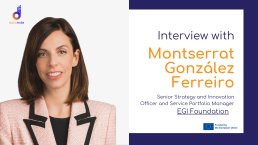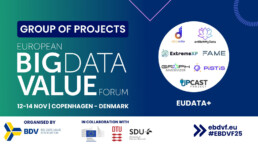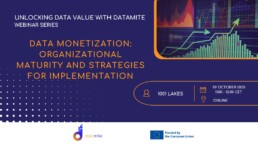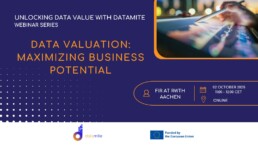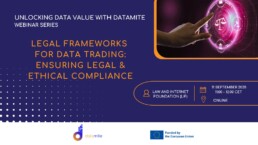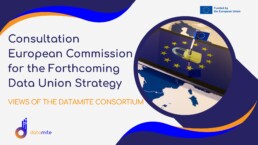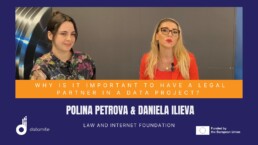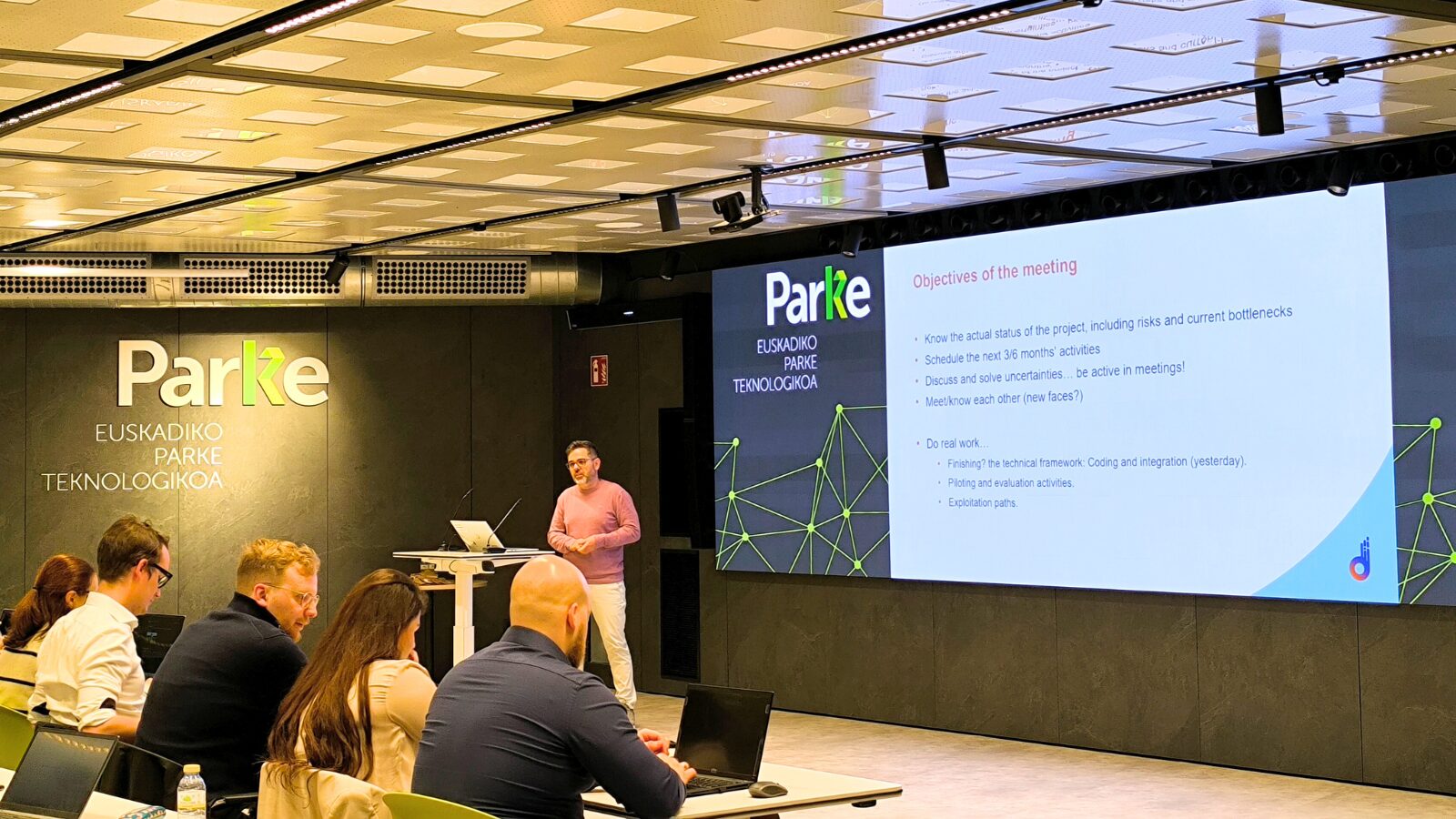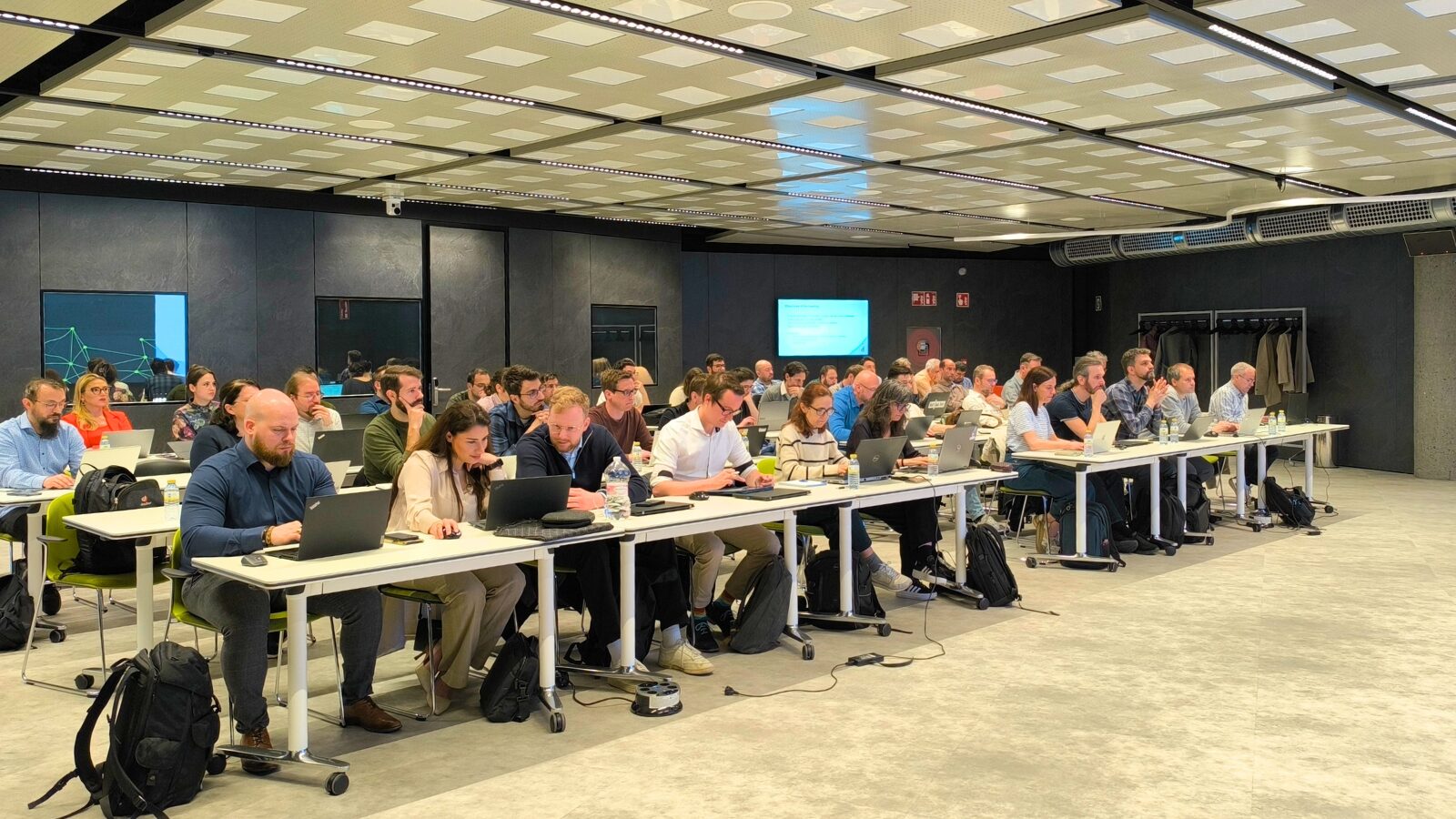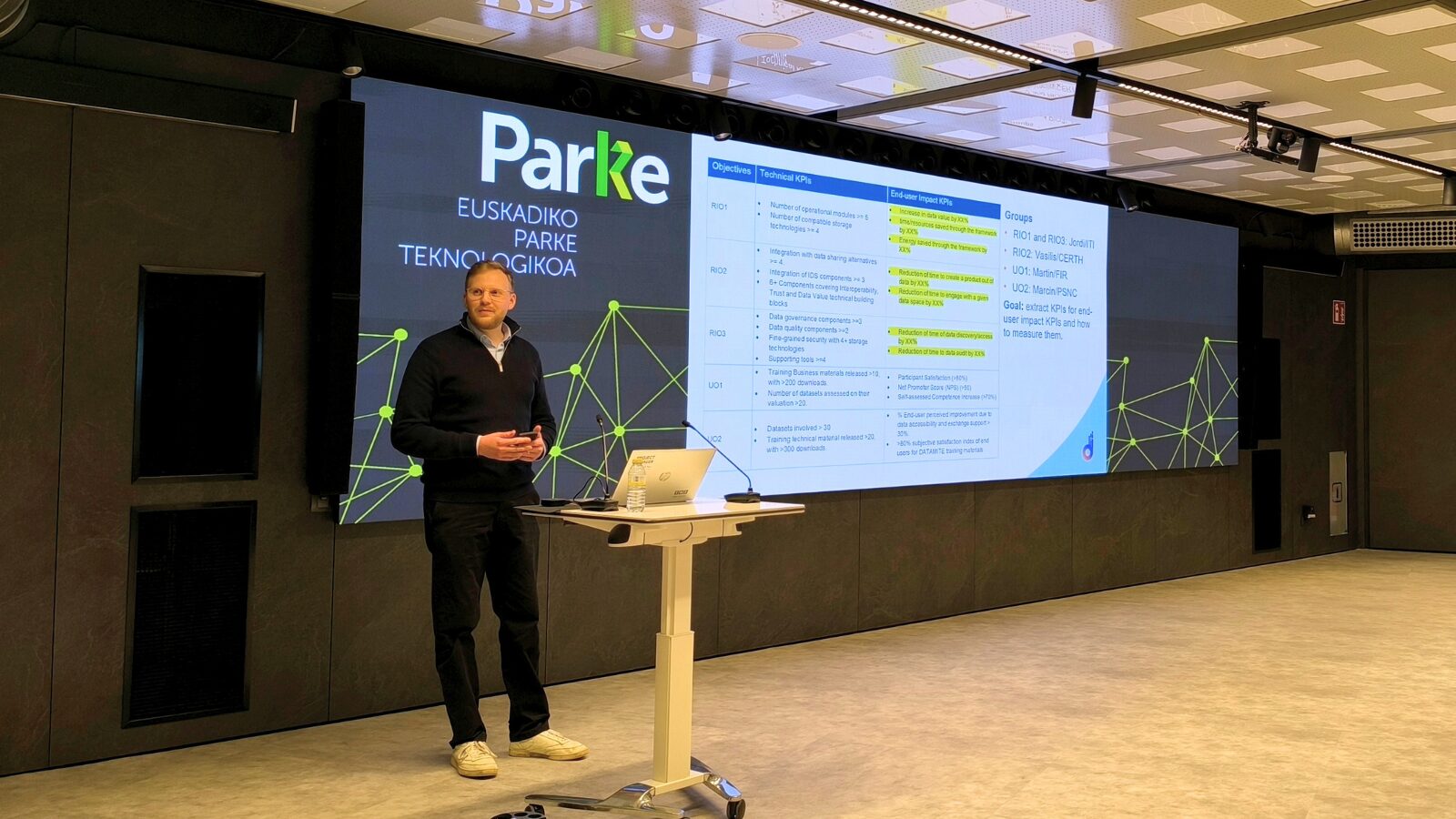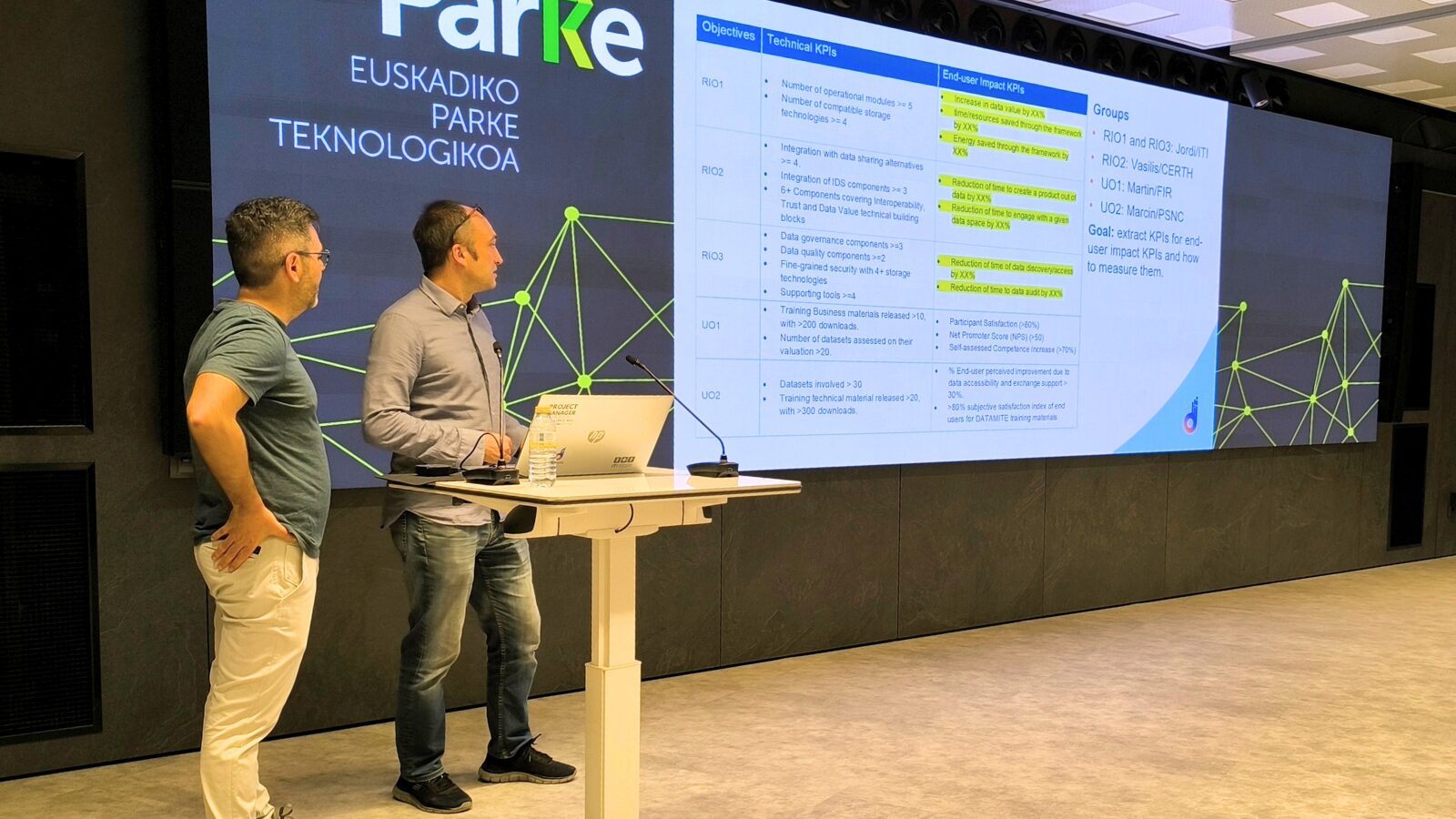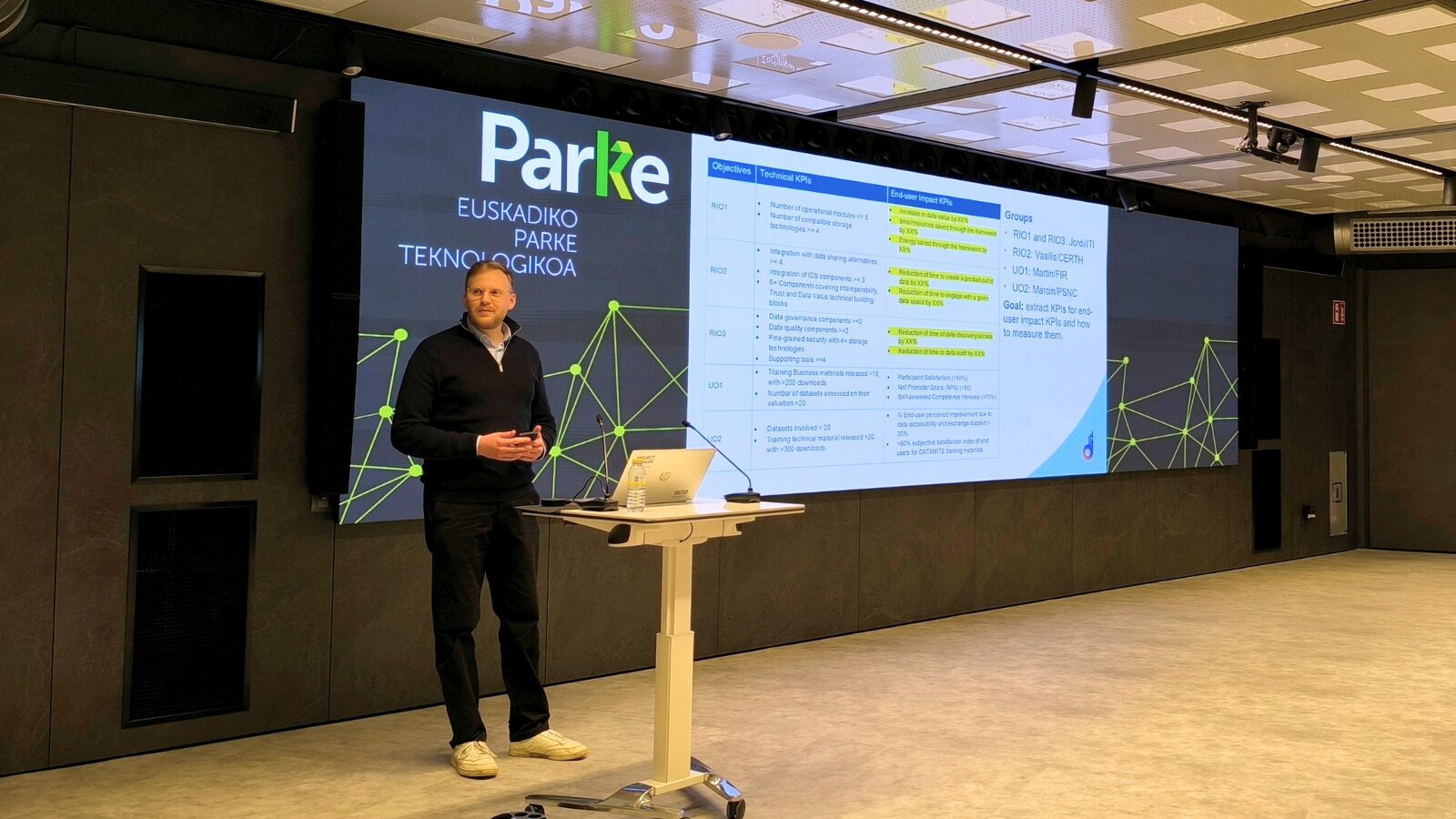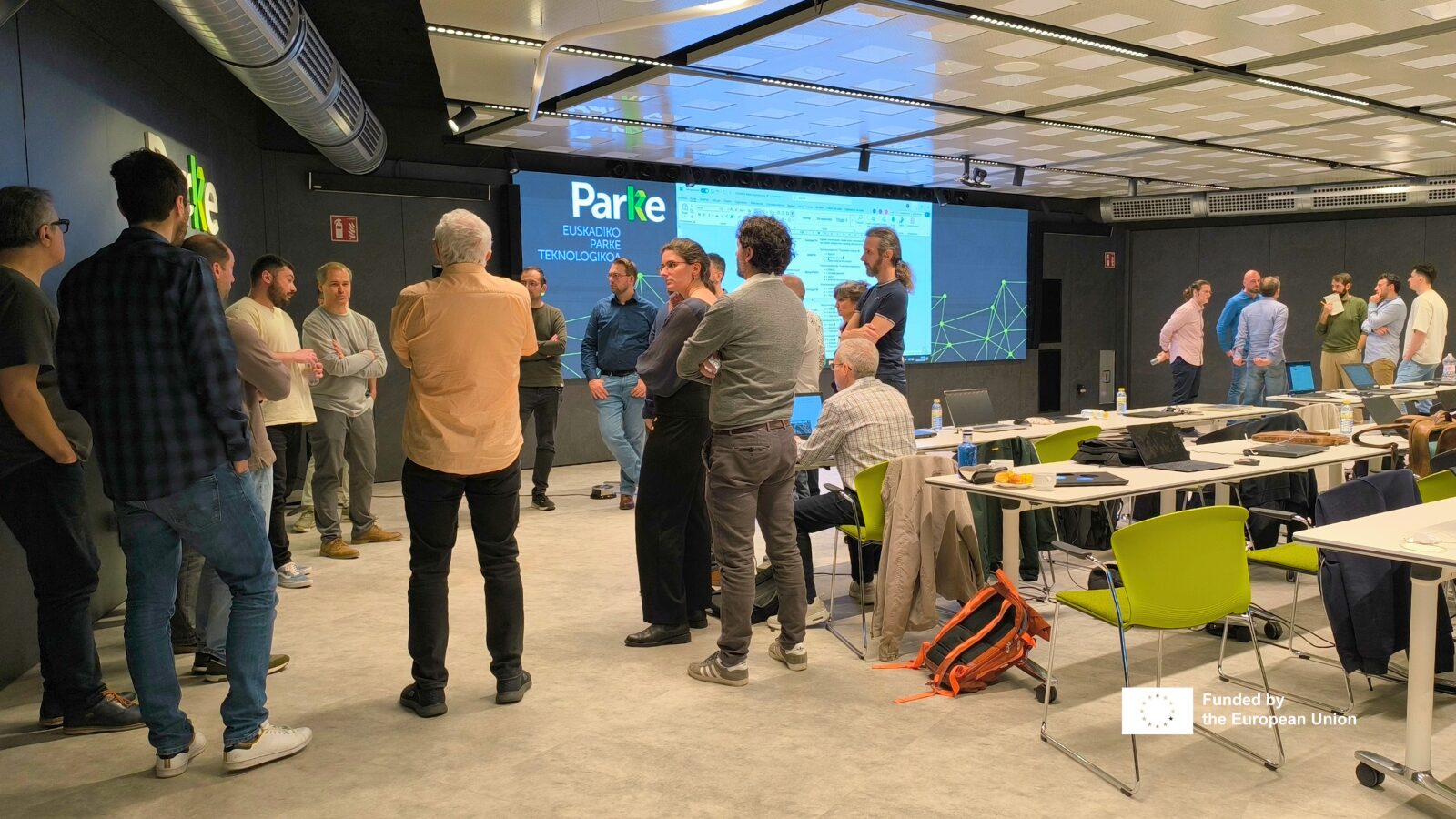Meet the people behind DATAMITE: Montserrat González Ferreiro (EGI Foundation)
DATAMITE is an ambitious project with a consortium of 26 organisations from 11 countries, but beyond the numbers are the people. With the series “Meet the people behind DATAMITE” we want to introduce the people who work every day to achieve our ambitious goal: to deliver a modular, open-source and multi-domain Framework to improve data monetising, interoperability, trading and exchange in the form of software modules, training and business materials for European companies, empowering them to become new relevant players in the data economy.
Today we interview Montserrat González Ferreiro, Senior Strategy and Innovation Officer and Service Portfolio Manager at the EGI Foundation.
Briefly introduce yourself
I am Montserrat González Ferreiro, Senior Strategy and Innovation Officer and Service Portfolio Manager at the EGI Foundation. I lead strategic initiatives, oversee the full lifecycle of EGI services, and champion innovative applications of research infrastructures to advance Science and support the scientific community.
What is your role in the DATAMITE project?
I am a team member of WP4: Beyond Sharing – A Business & Quality Approach to Foster the European Data Economy, focusing on the first three tasks of this work package. I have contributed to developing the Analytic Process Network (ANP) and Analytic Hierarchy Process (AHP) methodologies tailored for DATAMITE, co-authored related publications, and supported other tasks within the work package.
What motivates you to work in the fields of data, innovation or digital transformation?
I am driven by the transformative potential of data and digital innovation to enhance research, decision-making and societal impact. I enjoy turning complex needs into strategic opportunities and helping research organisations and projects unlock the full value of innovative, high-quality services and tools.
What do you hope to learn or achieve through your involvement in DATAMITE?
Through DATAMITE, I hope to deepen my understanding of best practices in business and quality management within the European data economy, particularly in the context of research infrastructures. I aim to contribute to sustainable, high-impact approaches for data sharing and reuse, while learning from the diverse expertise of project partners. Collaborating with my DATAMITE colleagues has been highly rewarding, leading to fruitful outcomes such as publications and tool development. Ultimately, I hope to translate these insights into practical strategies that help research organisations unlock the full potential of their data and services for the benefit of society.
What professional strengths or skills do you bring to the project?
I began my career in the private sector before moving into senior roles supporting the European research ecosystem, holding leadership positions at institutions such as BSC, ELIXIR Hub, and EMBL-EBI, and currently at the EGI Foundation. I have long-standing involvement in key European initiatives, including PRACE and EOSC projects since 2017. I hold an MBA in Management of Research Infrastructures, a BSc and MSc in Telecommunications Engineering, a Postgraduate Diploma in Parallel Computing Architectures for Science, and certifications in project management (PMP®), data protection, IT service management (FitSM Expert), and agile methodologies (PSM®, PSPO®).
What originally led you to your current career path?
My career path emerged from a combination of curiosity and a desire to make a meaningful impact in research and innovation. Starting in the private sector as a technical consultant and IT project manager, I developed a strong foundation in problem-solving and project execution. Over time, I was drawn to the European research ecosystem, where I could apply my skills strategically to support large-scale infrastructures and collaborative initiatives that advance science and society.
Do you have a short personal motto or guiding principle that reflects how you approach your work?
My guiding principle is: “Complex challenges are opportunities for meaningful impact.” I approach my work by seeking strategic solutions that not only address immediate problems but also create lasting value for research communities and society. Collaboration, curiosity, and innovation guide how I tackle each task.
Which challenges in your work inspire you to improve or innovate?
I am particularly inspired by challenges that involve coordinating distributed research infrastructures, aligning diverse stakeholders, and translating complex technical needs into practical, high-quality services. These challenges motivate me to innovate in strategy, processes, and service delivery, enhancing efficiency, sustainability, and societal impact.
What impact do you believe DATAMITE can have on European companies in the coming years?
DATAMITE has the potential to strengthen the European data economy by providing businesses with frameworks and tools to adopt best practices in data management, quality assurance, and innovation. By fostering data sharing, reuse, and interoperability, the project can help companies create higher-value services, improve decision-making, and enhance competitiveness, while contributing to a more sustainable and collaborative digital ecosystem across Europe.
If you want to always stay updated about our project, follow us on LinkedIn, Twitter and Bluesky!
PR | EUDATA+ at the European Big Data Value Forum (EBDVF) 2025
EUDATA+ Alliance Launched to Drive European Data Economy
November 2025 – The EUDATA+ Alliance, a cluster of seven projects funded under the European Commission's Horizon Europe programme and formed in 2024, is proud to officially announce its mission and activities. This flagship collaboration aims to accelerate data sharing, monetization, and interoperability across Europe, addressing a critical need to unlock the full potential of the European data market.
The Context: A Critical Moment for Europe's Data Economy
In a rapidly evolving global landscape, the European Commission's Competitiveness Compass, unveiled by President Ursula Von Der Leyen on January 29, 2025, highlights the urgent need for economic revitalization. With fierce international competition in the AI sector, Europe's ability to compete hinges on its capacity to leverage data. The European data market is projected to reach €141 billion by 2030, yet a surprisingly low number of companies currently engage in data sharing. This untapped potential represents a significant opportunity, with the right conditions capable of unlocking an additional €270 billion in GDP by 2028.
EUDATA+ is positioned to be a key driver in this transformation.
EUDATA+: A Flagship Collaboration
Initially formed for dissemination purposes, the EUDATA+ cluster has evolved into a more substantial partnership with shared goals and knowledge transfer. The alliance is committed to addressing the challenges of data sharing and is built on four key pillars:
- Scientific and Technical Collaboration: Fostering joint research and development.
- Communication & Dissemination: Building a strong community and sharing project outcomes.
- Business Topics & Strategies: Developing strategies for market exploitation and business models.
- Pilots & Use Cases: Demonstrating the practical application of technologies.
The cluster's offerings include advanced technologies, scalable solutions for high-volume transactions, and approaches for data and metadata interoperability. By integrating research in data management, privacy, monetization, and compliance, EUDATA+ directly contributes to the development of European Data Spaces.
The Projects Involved
The EUDATA+ cluster unites seven projects, each bringing a unique contribution to the alliance:
- PISTIS: A secure platform for sharing, trading, and monetizing proprietary data, leveraging technologies like federated data sharing and AI-driven quality assessment.
- FAME: A unique, trustworthy, energy-efficient, and secure federated multi-sided data marketplace with trading and monetization for applications and services in Embedded Finance (EmFi) and more.
- UPCAST: A project providing transparent, user-friendly plugins to automate data-sharing agreements across various entities.
- enRichMyData: An open toolbox with scalable components to help organizations enrich their data and improve reusability.
- DATAMITE: A modular, open-source framework to boost data monetization, interoperability, and exchange for SMEs, large enterprises, and public administrations.
- Graph-Massivizer: A scalable platform for processing extreme data as massive graphs, offering open-source tools for data ingestion and analysis.
- ExtremeXP: A human-centred, experimentation-driven analytics framework designed to optimise complex data-driven workflows—integrating user preferences, feedback, and analytics variants to yield accurate, personalised, trustworthy insights.

EUDATA+ at the European Big Data Value Forum (EBDVF) 2025
The EUDATA+ Cluster is set to host a high-impact session, "EUDATA+: A Journey Through the Data Lifecycle - Innovations, Use Cases, Values," at the European Big Data Value Forum (EBDVF) 2025. This unique session will take attendees through the full journey of data, from acquisition and enrichment to its real-world exploitation, presenting the outcomes and future outlook of the seven collaborative European projects. Experts from the EUDATA+ projects will demonstrate their innovative solutions across every phase of the data lifecycle—including data ingestion, enrichment, product creation, publication, exchange, and consumption—followed by targeted examples of how these solutions are shaping the future of key European sectors such as Smart Cities, Mobility, Energy, Climate, Finance, Industry, and Innovation. Participants will gain an understanding of both the cutting-edge technologies and the tangible value they deliver in critical applications like climate predictions for insurance, green finance, and smart grid management. Join the session on 13 November at 10:50, DGI Byen, Copenhagen.
If you are interested in discovering more about the EUDATA+ projects, come visit us at our booth from 12 to 14 November; representatives from the seven projects will be there to satisfy your curiosity and exchange feedback.
Contacts and references:
Organizers: Ernesto Troiano ernesto.troiano@gft.com, Richard Stevens <rstevens@idc.com>, Till Christopher Lech <Till.Lech@sintef.no>
Communication: Nuria De Lama Sanchez <ndelama@idc.com>
Press release of EBDVF 2025: https://european-big-data-value-forum.eu/wp-content/uploads/2025/10/EBDVF-2025-Press-Release.pdf
DATAMITE plenary meeting in Valencia
From 29 to 30 October, the DATAMITE consortium held its final plenary meeting of 2025 in Valencia, Spain. This important meeting was held to discuss the steps needed to achieve the project’s goal before DATAMITE ends, following the grant of an extension. As at the previous plenary meetings in Aachen and in Bilbao, the agenda included a CodeCamp day with the project’s developers on the first day, followed by two days with the entire consortium. Each work package presented its progress and future steps.
Hosted by ITI (Instituto Tecnológico de la Informática), the two-day plenary meeting focused on reviewing project progress, strengthening collaboration, and coordinating upcoming work phases. On the first day, Daniel Sáez Domingo (ITI) delivered a warm welcome, after which an in-depth session was held dedicated to the project management work package. During this session, Santiago Cáceres Elvira (ITI) provided an update on project coordination, while Jordi Arjona Aroca (ITI) shared insights on data asset size. Margit Hofer (ZSI) examined gender bias in data practices, and Santiago Cáceres outlined the definition of new KPIs focused on end-user value.
The morning continued with a live demonstration of the DATAMITE front end, presented by Jordi Arjona (ITI) and Vasilis Siopidis (CERTH), who showcased the latest functionalities of the DATAMITE Framework. After lunch, participants attended the 'A Business and Quality Approach to Fostering the European Data Economy' session, during which Eduardo Vyhmeister (University College Cork), Udo Bub (1001 Lakes) and Rob Schneider (FIR and der RWTH Aachen) presented the final blueprint structure and provided an in-depth analysis of the valuation model. The day concluded with parallel working sessions, during which teams agreed on pilots, KPIs and the next technical and business milestones.
Building on the momentum of the first day, the second day focused on the Integration, Demonstration and Validation work package. The six DATAMITE pilots took centre stage, with each team sharing updates on their progress, validation activities and demonstrations. These presentations demonstrated the substantial technical advancements being achieved in all pilot areas. In the afternoon, the partners split into discussion groups, each dedicated to a specific topic. One group, led by Antonis Sapountzis (AUSTRALO), focused on outreach, exploitation and collaboration. Meanwhile, technical and KPI-oriented discussions continued to ensure coherence across all pilots as the project moved towards upcoming milestones. Santiago Cáceres (ITI) concluded the meeting by providing a summary of the collective achievements and the value of the two days of productive discussions.
If you want to always stay updated about our project, follow us on LinkedIn, Twitter and Bluesky!
Webinar series | Data Monetization: Organizational Maturity and Strategies for Implementation
We are launching the new series of webinars ‘Unlocking Data Value with DATAMITE!’ to showcase the work carried out at DATAMITE over the last years.
On 9 October, Udo Bub from 1001 Lakes, delivered the third webinar in our 'Unlocking Data Value with DATAMITE' series, exploring data monetisation.
You can view the presentation here.
If you want to always stay updated about our project, follow us on LinkedIn, Twitter and Bluesky!
Webinar series | Data Valuation: Maximizing Business Potential
We are launching the new series of webinars ‘Unlocking Data Value with DATAMITE!’ to showcase the work carried out at DATAMITE over the last years.
On 2 October, Rob Schneider from FIR an der RWTH Aachen, Margit Hofer from Centre for Social Innovation (ZSI) and Eduardo Vyhmeister from University College Cork delivered the second webinar in our 'Unlocking Data Value with DATAMITE' series, exploring data valuation.
You can view the presentation here.
If you want to always stay updated about our project, follow us on LinkedIn, Twitter and Bluesky!
Webinar series | Legal Frameworks for Data Trading: Ensuring Legal & Ethical Compliance
We are launching the new series of webinars 'Unlocking Data Value with DATAMITE!' to showcase the work carried out at DATAMITE over the last years.
On 18 September, Polina Petrova from Law and Internet Foundation and Margit Hofer from Centre for Social Innovation (ZSI) launched our new webinar series: 'Unlocking Data Value with DATAMITE'. They delivered a one-hour webinar exploring the legal frameworks for data trading.
You can view the presentation here.
If you want to always stay updated about our project, follow us on LinkedIn, Twitter and Bluesky!
Consultation European Commission for the Forthcoming Data Union Strategy: Views of the DATAMITE Consortium
In line with its policy of contributing to open science and having a real impact on European data policies, DATAMITE is making its views on the European Commission's consultation for the forthcoming Data Union Strategy available to everyone.
Law and Internet Foundation, a DATAMITE partner, has written a policy brief in which DATAMITE aims to contribute to and enhance the forthcoming New European Strategy for Data. “In view of the launched Open Consultation on the forthcoming New European Strategy for Data, the following paragraphs are concerned with evaluating considerations drawn from the experience of DATAMITE, but also general views beyond its context, that shall serve as guiding points when deciding on the pillars of the New Strategy”, she says.
Read the EU Data Strategy policy brief here, or the extended version here.
If you want to always stay updated about our project, follow us on LinkedIn, Twitter and Bluesky!
DATAMITE from a business point of view
Designed with real market needs in mind, DATAMITE enables companies to unlock the value of their data. It provides tailored monetisation strategies, open-source tools and actionable business models to achieve this. In the 'DATAMITE from a business point of view' video series, we explore how DATAMITE facilitates fair data valuation, generates new business opportunities and establishes a foundation for the sustainable exploitation of data across European industries. To this end, we interviewed four partners responsible for some of DATAMITE's use cases.
Konstantinos Kontodimas and Iason Panagos from HEDNO, a key partner in the development of DATAMITE pilots. From a business perspective, HEDNO demonstrates how the DATAMITE Framework empowers organisations to accelerate their digital transformation and enhances the efficiency and sustainability of electricity distribution networks.
Ricardo Henriques and Pedro Boto from E-REDES, DATAMITE’s partner leading the 'Leveraging Electricity Distribution Open Data' Pilot. From a business perspective, a refined version of the DATAMITE framework could be deployed and managed by E-REDES's DATAHUB to share data with external stakeholders. In addition, data stewards could then be given permissions to create artefacts and data products, define relevant data quality KPIs, and define the entities with which the data should be shared, giving them more autonomy in the process.
Achilleas Marinakis and Christos-Antonios Gizelis from OTE, DATAMITE’s partner leading the 'Corporate Multi-Site Data Exchange' pilot. From a business perspective, OTE shows how the DATAMITE Framework can create new opportunities for data-driven innovation and improve operational efficiency in the energy sector.
Federico Piñuela García from Grupo Gimeno, DATAMITE’s partner leading the 'Corporate Multi-Domain Data Exchange with DIH Support' pilot. From a business perspective, Grupo Gimeno uses the advanced data-sharing and analytics capabilities of the DATAMITE framework to optimise processes and unlock new business.
If you want to always stay updated about our project, follow us on LinkedIn, Twitter and Bluesky!
Why is it important to have a legal partner in a data project?
At DATAMITE, our goal is to encompass every facet of data exchange and monetisation. To this end, our consortium includes partners that extend beyond the technological and monetary fields, such as the Law and Internet Foundation (LIF). LIF is responsible for providing thorough insights into the EU legal framework for data transfers, with a particular focus on the Regulation on the Free Flow of Non-Personal Data in the European Union and the General Data Protection Regulation (GDPR).
To illustrate the importance of having a legal partner on a project like DATAMITE, we interviewed Polina Petrova and Daniela Ilieva from LIF. They explained how their work enables the formulation of tailored legal and ethical requirements specific to the technical components of DATAMITE, ensuring their compliance with relevant legal and ethical requirements.
Watch the video here and below.
DATAMITE Plenary Meeting in Bilbao
From 8 to 10 April, the DATAMITE consortium held its first plenary meeting of 2025 in Bilbao, Spain. This important meeting was held to discuss the steps needed to achieve the project's goal before DATAMITE ends, presumably by the end of the year. As at the previous plenary meeting in Aachen, the agenda included a CodeCamp day with the project's developers on the first day, followed by two days with the entire consortium. Each work package presented its progress and future steps.
The first day was spent at CodeCamp. This edition focused on coding and component integration. Participants were split into groups and worked on specific tasks related to Work Packages 2 (Data Sharing Mechanisms and Data Sovereignty) and 3 (Data Governance, Quality, Security and Support Modules). Through collaborative sessions and structured objectives, the teams made significant progress in developing and integrating these components. This culminated in a joint wrap-up session, during which the teams presented their achievements and planned their next steps.
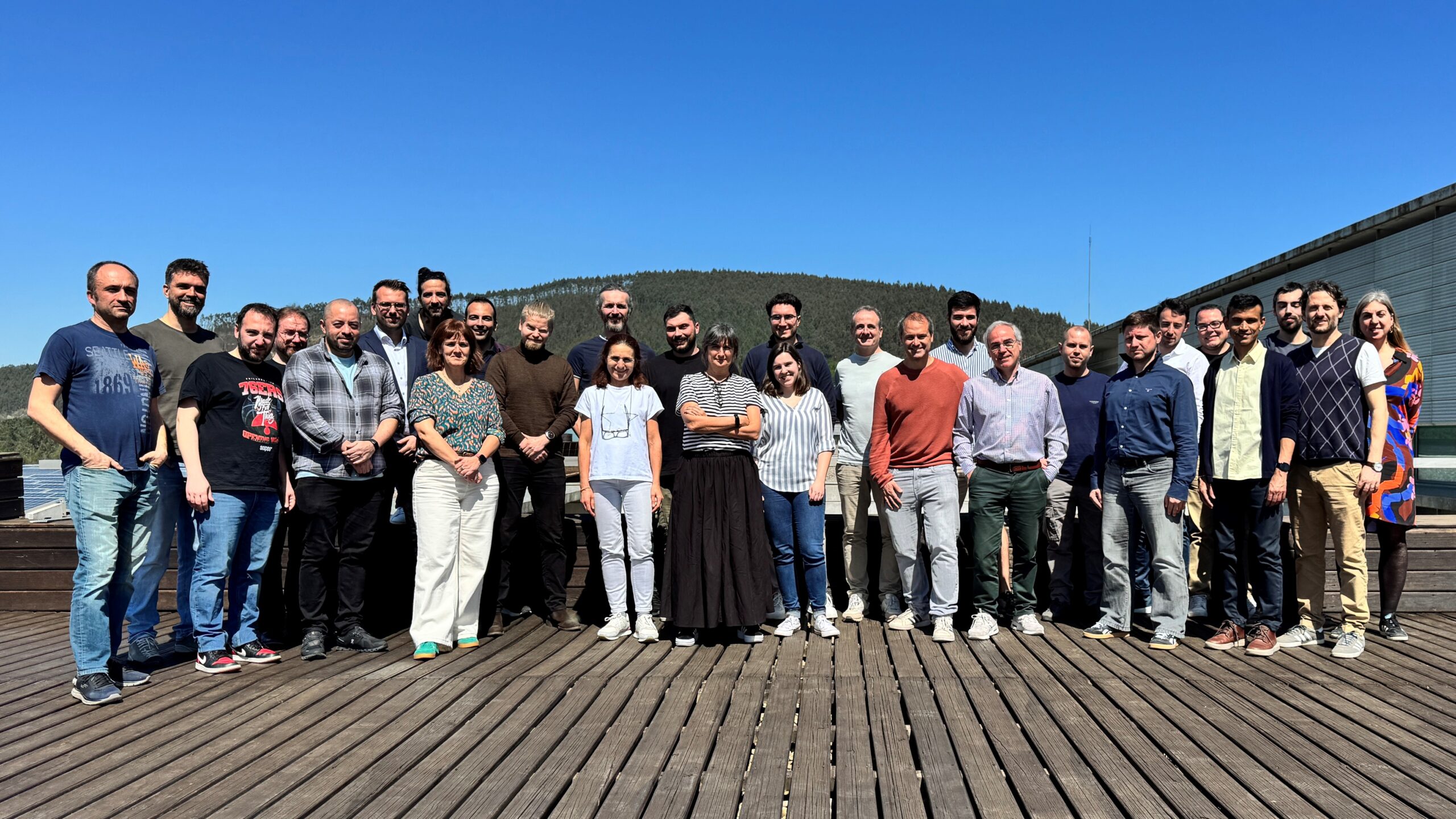
The remaining partners who were not involved in the CodeCamp joined on 9 and 10 April. The two-day plenary meeting focused on reviewing progress and aligning the next steps for all work packages. On the first day, the project coordinator (ITI) began with updates, outlining the project's current status, future deliverables, and important recommendations. Sessions covered essential topics such as data asset sizing, KPI development, legal applicability, energy consumption. Each topic was discussed through concise, action-oriented presentations.
One of the day's highlights was the interactive 'Gender Bias' session, which was led by Margit Hofer from ZSI. She illustrated how poor data quality affects not only a company's revenues, but also society, resulting in biases in AI models relating to race and gender. Approaching the topic from a dynamic, brainstorming perspective as a project was very instructive and inspiring.
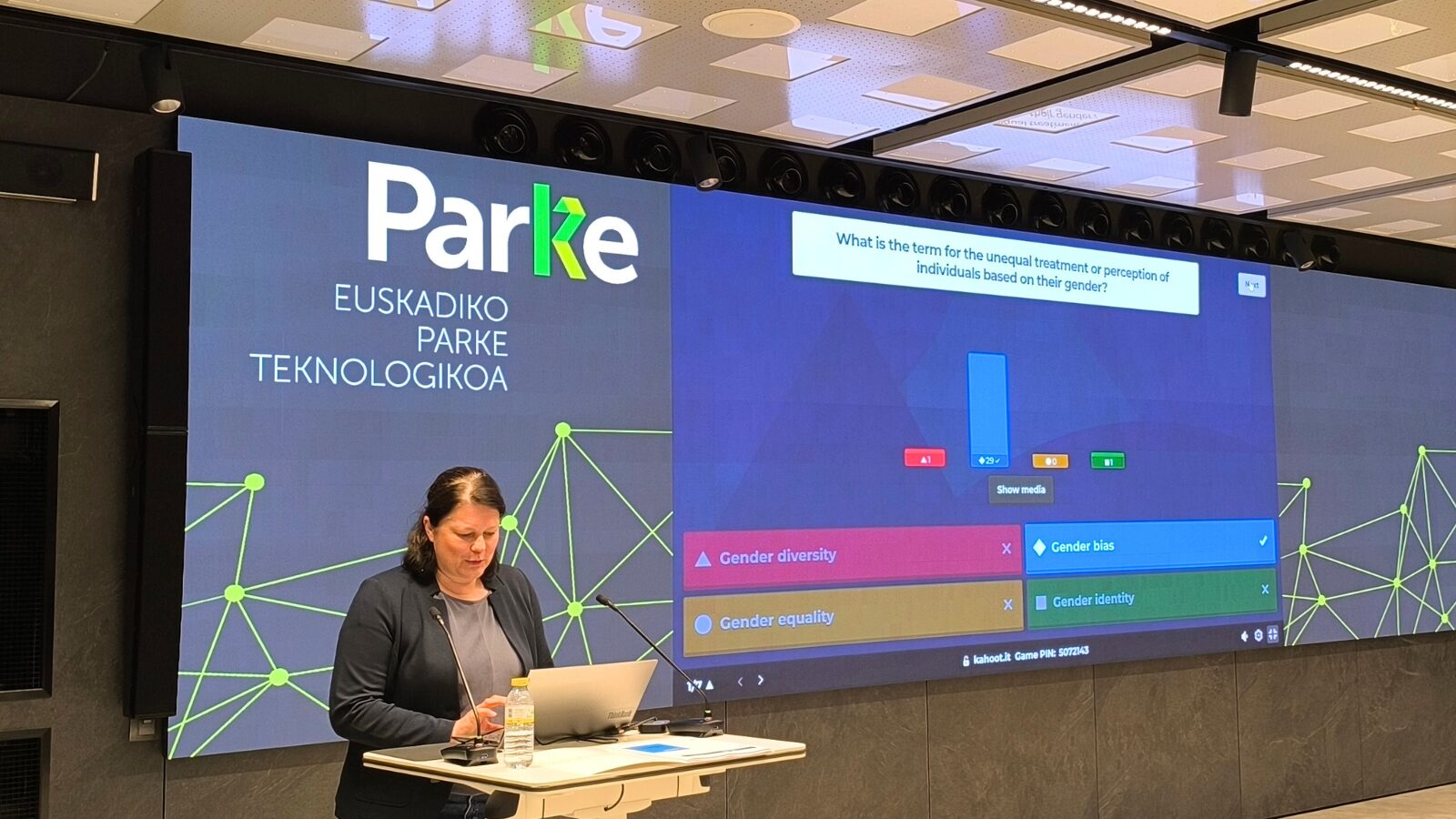
In the afternoon, Pilots 5 and 6 were spotlighted to demonstrate progress on real-world integration. This was followed by an in-depth exploration of open-source business models and Eclipse ecosystem opportunities.
The second day covered the remaining pilot updates (Pilots 1–4), communications KPIs, the intellectual property strategy, and the Data Monetisation Maturity Model. The meeting concluded with a discussion about future training materials, preparing the consortium for the next implementation phase.
In addition to three days of intensive work, the DATAMITE consortium enjoyed a visit to the Guggenheim Museum, followed by a traditional Basque dinner in the centre of Bilbao. Many thanks to our colleagues at Tecnalia for hosting the plenary meeting.
If you want to always stay updated about our project, follow us on LinkedIn, Twitter and Bluesky!

